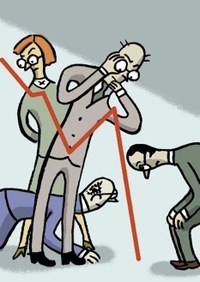Hello Friends! Thanks so much for stopping by and visiting my blog, Stock Picks Bob's Advice! As always, please remember that I am an amateur investor, so please remember to consult with your professional investment advisers prior to making any investment decisions based on information on this website.
 I thought you might enjoy this illustration from the 3 Quarks Daily Blog which illustrates the concept of averaging down. What better topic to discuss after this week of dismal trading activity?
I thought you might enjoy this illustration from the 3 Quarks Daily Blog which illustrates the concept of averaging down. What better topic to discuss after this week of dismal trading activity?
But seriously, the letter from Raj that I discussed earlier today presented the question about averaging down without me commenting on that issue. That is something that really needs to be addressed imho and I would like to share with you some of my thoughts on this subject.
First of all, let's explain what "averaging down" means. In a simple fashion, this means reducing the mathematical average of your cost of an equity by purchasing more shares after it declines in price, much like Raj did with Synalloy. This isn't necessarily a bad idea. It would seem that if a stock was a good buy at $30/share, then shouldn't it be a 'better buy' at $25? And if the reasons to make a purchase were good at $30, wouldn't those reasons make that decision to buy even more compelling at a lower price?
Perhaps.
I would like to suggest there are two different perspectives one could have on this subject depending on whether one is essentially a 'value investor' or whether one is more of a 'momentum investor' or 'market timer'.
Jim Cramer has on occasion been an advocate of 'averaging down'.
A couple of examples: On November 29, 2006, Cramer commented on UnitedHealth (UNH):
"I think the nightmare is about to change. Because we're at the beginning of a healthcare rally that UNH will participate in. Pull the trigger. Average down. Buy more. I don't think you'll regret it."
This year, on June 15, 2007, Cramer commented on Switch & Data Facilities (SDXC):
"No, it has not been good. It does what is known as co-location. It's a terrific, terrific play on internet growth... I know averaging down is not something people like. I made a lot of money doing it when I'm investing, and I bless more buying."
So Cramer sometimes believes so strongly in stocks that he suggests it is wise to buy shares, at least occasionally, in a stock that has declined after your purchase.
But Cramer is not alone on this.
Rick Munarriz wrote a piece on Motley Fool in a Bull/Bear discussion of this topic and advocated averaging down. Rick commented in part:
"Yet when you refuse to take advantage of a buying opportunity when a quality company tumbles because you are tied to a "Cut Your Losses" mantra or cocky to the point that you refuse to accept that you didn't "Buy Low" in the first place, do you know what you're doing? You are passing up on a more attractive purchase scenario than the one your initial due diligence led you to make."
Jonathan D. Poland made the argument for averaging down based on a Benjamin Graham valuation argument:
"I always seek value and believe in what Ben Graham taught: there are no good or bad stocks, just cheap or expensive. That's where the margin of safety and using the markets fluctuations to your advantage."
But there are many voices out there that speak against averaging down (including mine).
A nice column on dummyspots.com writes about "Rule 7: When To Average Down":
"Never. Never ever. Never ever ever. Never Never ever Never Never ever ever.
This one should actually not even come up. When you enter a position, you know your time frame and you have an initial stop. If you stay with your time frame and respect your stop, you’ll be taken out when the position turns against you, and you won’t have the opportunity to add to a losing position.
If you are tempted, remember: the fact that you are “under water” in your position proves that you were already wrong in your evaluation of this stock. What makes you think you’re a better judge of it now that you’re bleeding?
Adding to a losing position is the ego’s attempt to be right at any cost, or even worse, greed trying to add to the profits you’ll make when the rest of the world figures out it was wrong and you were right. If that’s what you’re experiencing, you should be exploring the deeper reasons why you’re trading in the first place."
Another well-known investor, Harry Domash had this to say about averaging down:
"4. Never average down.
Averaging down means buying more shares after a stock you bought went down instead of up. Say you buy 100 shares of a stock for $20 per share. Then it drops to $10. To get back to break-even, the stock would have to double.By averaging down, which in this case means buying 100 more shares at $10, you can break even if the stock pops back up to $15, instead of $20.
Bad idea! The stock dropped because something went wrong. Chances are, the stock will drop even further."
David Forrest, on Motley Fool, had this to say in the bear/bull case on averaging down:
"Never average down! You heard me. Don't ever average down. The process of buying a stock, watching it fall, and then throwing more money at it in the hopes that you'll either get back to even or make a bigger killing is one of the most misguided pieces of advice Wall Street has ever dispensed. I'm talking about when someone buys a stock, watches it fall 10 points (or however much it takes to make you violently ill), and then contemplates the absurd: "Shall I risk even more than I originally intended in a desperate attempt to lower my cost and save my butt?" The answer, over and over again, is a big, fat "NO.""
So what is the proper approach? I believe very strongly that one should listen to what the market is telling you. It is foolish to believe that you are wiser than the market in each and every decision that you make. When you make an investment decision to purchase a stock and the stock price increases (assuming you are long the investment), then that was a wise and correct decision.
If, on the other hand, the stock price declines after your purchase, you may well have done your homework, but you should never consider yourself wiser than the market. Respect the market. In other words, if you have set up an 8% loss limit, and I do, and the stock has reached that limit on a decline, your are wiser to sell that stock and limit your losses to a small loss than to buy more shares believing that this was time to 'increase your wager' on your decision because somehow you are wiser than the rest of the market.
That is a formula for disaster imho.
There are multiple sides to managing a portfolio. One has to decide what criteria are required to pick a stock to place into your holdings. After that you need to decide when you need to sell both on the upside and on the downside.
When your stocks decline, your portfolio is talking to you. It is telling you to exercise caution. Be ready to pull the plug on those investments. Be prepared to 'sit on your hands' with the proceeds.
There will be many times when averaging down works well. If you have a great stock that declines and you buy more shares then the market turns around and the stock climbs again you shall look brilliant. But there shall be stocks that decline and then spend years with large decreases in price to possibly never assume their heights of price valuation. The more you buy as those stocks decline, the greater your loss. You will not look or feel brilliant.
When managing your portfolio, sell your losing stocks quickly and completely at preset limits. Respect the market. Listen to what it is telling you.
So averaging down, while ok for some, will not work with my strategy. Otherwise you will be like Raj feeling like you were broadsided with a loss and wondering 'what to do next?'.
Thanks so much for visiting my blog. If you have any comments or questions, please feel free to leave them on the blog or email me at bobsadviceforstocks@lycos.com. I do not mean to be so gloomy. But then again, it was a pretty awful day in the market, wasn't it?
Bob








